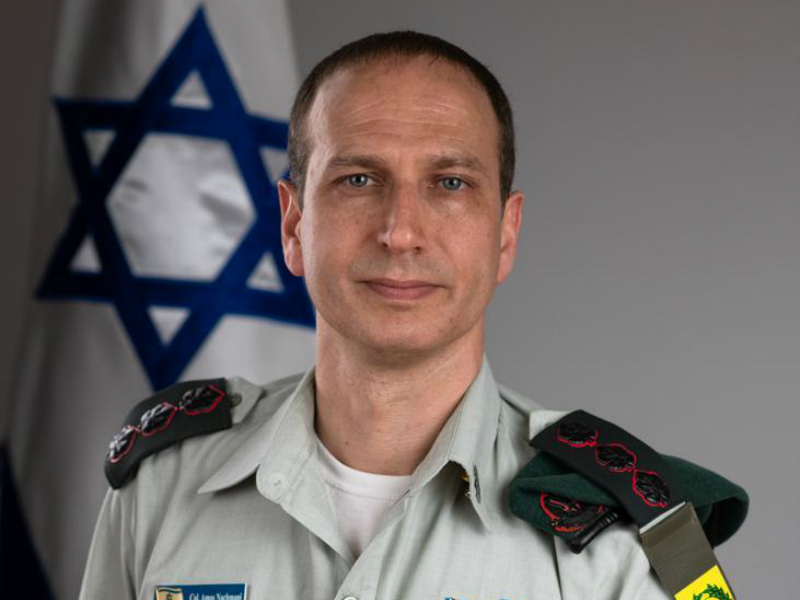Col. Amos Nachmani has been in Canada for a couple of years now and, along with his family, he’s embraced the cold.
It’s not something he’s used to, coming as he does from warm weather Israel. Winter snow and skiing are something they’ve learned to enjoy, so while they’re here, they’ll take full advantage of it.
As Israel’s defence attaché in Ottawa, his sojourn in Canada is slated to last three years. But it’s a busy three years, during which he represents the Israeli military and serves as a liaison to the Canadian Armed Forces.
It turns out that there is a great deal of co-operation between the two militaries – everything from the exchange of ideas, to trade in hardware.
Nachmani, a former tank combatant, infantry battalion officer and intelligence officer, is one of only 22 international military attachés stationed in Canada. The Canadian Armed Forces liaises with other militaries from around the world, but most of them are based in Washington, D.C. Yet ever since then-prime minister Stephen Harper and Israeli Prime Minister Benjamin Netanyahu agreed to a greater level of military co-operation in 2011, Israel has stationed a military attaché to Canada. At the same time, Canada has its own attaché in Tel Aviv.
Military co-operation between the two countries has continued under both Conservative and Liberal governments. “Our relationship is robust and totally agnostic to the notion of who is in power,” Nachmani said.
Nachmani said he engages “regularly with the different services in the Canadian Armed Forces, to understand your capabilities, your needs, your plans, in order to see where we can help each other out.”
During his time in Canada, he has been invited to military briefings, witnessed exercises and visited bases.
In 2017, Nachmani joined former Canadian chief of the defence staff, Gen. Thomas J. Lawson, to discuss “The Future of the Israel-NATO Strategic Partnership.”
On Nov. 11 for the past two years, Nachmani laid a wreath during the Remembrance Day ceremony at the National War Memorial in Ottawa.
He’s discussed with his Canadian colleagues “force buildup,” in which they share tactical methodologies, best practices and partake in military diplomacy.
The idea, he said, is to find areas of common interest, “bridge gaps and find common solutions,” and make sure his Canadian counterparts understand “our side of the picture.”
How does that translate in a practical sense? Nachmani points to Canadian involvement in Afghanistan, where our military was part of an international effort to fight al-Qaida. Canadian forces had unfortunate experiences with improvised explosive devices (IEDs), which caused casualties.
“This is a serious problem. We also encountered this in the past in southern Lebanon and Gaza,” Nachmani said.
The two militaries addressed the problem jointly by engaging in research and development of a system that would warn of concealed IEDs.
“That brought a good, robust solution and both militaries have implemented it,” Nachmani said.
Trade is also part of the military relationship between the two countries. Altogether, Israel defence industries sell to Canada an annual average of a little under US$100 million ($133 million) in military hardware, mostly radar and electronic warfare equipment, he said.
Prior to moving to Ottawa, Nachmani commanded the IDF’s International Cooperation Unit, where he met Canadian officers.
For other militaries, the IDF “is a very valuable partner and ally for a country like Canada, due to our deep understanding of the situation in the Middle East, our intelligence capabilities and assessment, and our operational experience,” he said.
Canada has sent troops to Afghanistan, on peacekeeping missions and to Iraq to fight ISIS. Canada turns to Israel, and others, for added value in learning ways to understand the Middle East, he said.
From his experience interacting with Canadian soldiers, Nachmani believes the IDF and the Canadian Forces share many values: “These are two Western allies that value the Western way of living, liberal values, law-abiding militaries and countries.”
Both have a respect for human life and always try to minimize collateral damage in their operations, he added.
While Canada is much larger in size than Israel, its Armed Forces are much smaller. They include only 65,000 career soldiers and another 35,000 reservists.
Israel has about 40,000 career soldiers, along with 100,000 conscripts serving at any one time. In times of emergency, it can call up as many as 650,000 soldiers, he said.
As for the differences between Israeli and Canadian soldiers, Nachmani pointed out that when Canadians are deployed, they’re often sent to the other side of the world. “They don’t think how this will affect the people at home,” he said, whereas the average Israeli soldier is usually deployed an hour drive from home, so the attacks on Israel feel personal.
